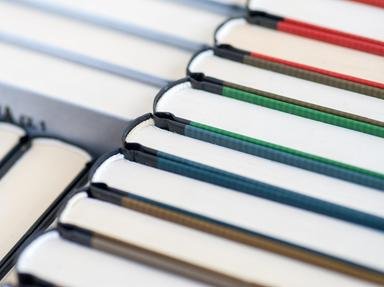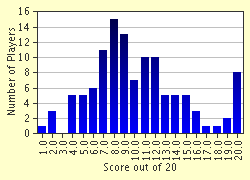Quiz Answer Key and Fun Facts
1. Which of the following is not one of Blake's major prophetic books?
2. Which of these poems, which speaks of an "invisible worm," has frequently been interpreted in a sexual context?
3. William Blake received formal education in only one subject. Which?
4. Which book is subtitled "Showing the Two Contrary States of the Human Soul"?
5. Whose mother died when he "was very young," and who was sold before his "tongue / Could scarcely cry"?
6. Did Blake teach his wife to read?
7. Who says, "And then I'll stand and stroke his silver hair, / And be like him, and he will then love me"?
8. Blake once pushed a soldier out of his garden and all the way to a nearby inn, where the soldier was quartered. The soldier then charged Blake with what?
9. Complete this line from "The Tyger": "Did he smile his work to see? Did he who made the ____ make thee?"
10. Blake was a rousing success not only as a poet but also as a painter, with his one-man show drawing enormous crowds. Is this statement true or false?
11. Which work contains a title page depicting a naked man throwing himself upon a scantily clad woman, while another woman looks on?
12. When he died, Blake had been working on illustrations for the writing of which author?
13. Whose sigh "runs in blood down Palace walls"?
14. Which of the following books, according to Blake, contained all he knew?
15. Who was "binding with briars" the poet's "joys and desires" in "The Garden of Love"?
16. Who are the daughters of Albion?
17. In what portion of "The Marriage of Heaven and Hell" do we find: "Drive your cart and your plow over the bones of the dead"?
18. In "To Autumn," Blake describes Autumn as "laden with fruit, and stained / With the blood of the ___." What belongs in the blank?
19. Whom does Blake tell to "Mock on, Mock on"?
20. What monk said of William Blake: "As for the other Romantics: how feeble and hysterical their inspirations seem next to the tremendously genuine and spiritual fire of William Blake"?
Source: Author
skylarb
This quiz was reviewed by FunTrivia editor
bullymom before going online.
Any errors found in FunTrivia content are routinely corrected through our feedback system.


